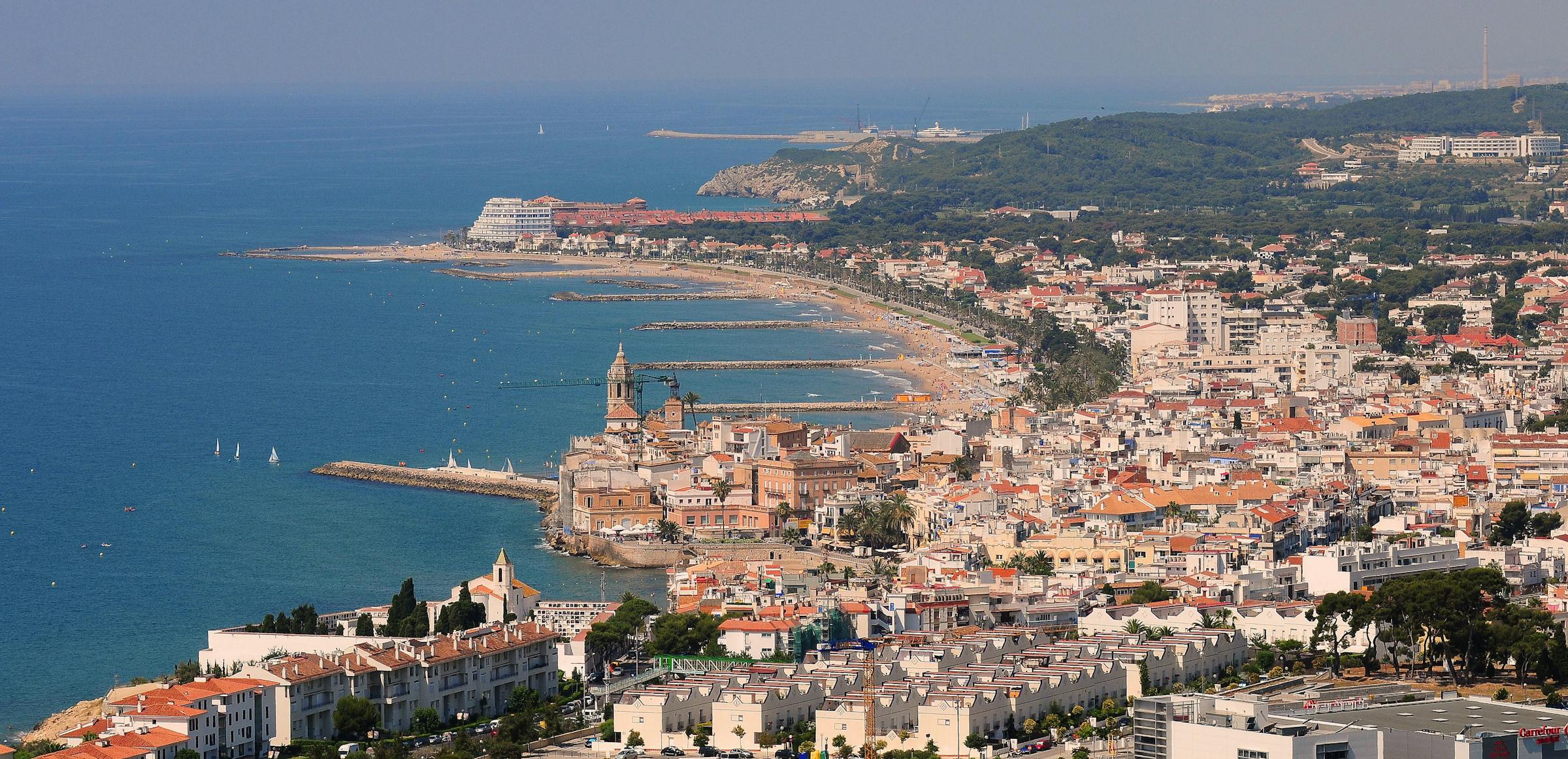 Photo by Mike McBey on Flickr
Photo by Mike McBey on Flickr Moving to Spain from the UK After Brexit

Olivia Willemin
Guide

Writing for Monito, Olivia is here to help users navigate the world of money transfer fees, exchange rates, and tips and tricks that help you make your best decisions.
Links on this page, including products and brands featured on ‘Sponsored’ content, may earn us an affiliate commission. This does not affect the opinions and recommendations of our editors.
Read moreSpain is an excellent country to consider relocating to: with its breathtaking landscapes and well-developed cities, it has something to offer for everyone. Home to many exciting new industries, tech, and more, its professional and economic landscape provides many opportunities for specialists in many fields.
If you're thinking about moving to Spain from the UK, then there's a lot to consider: work permits, residency permits, economic opportunities, healthcare, lifestyle, and more. Monito's experts are here to guide you through your questions.
What to Ask Yourself before Moving to Spain from the UK
- 01. What type of visa will I need if I'm going to Spain for a short time?
- 02. What kind of long term visas are available for UK citizens?
- 03. Can I bring family with me to Spain?
- 04. How can I get permanent residency in Spain as a UK citizen?
- 05. What are salaries like in Spain compared to the UK? What about cost of living?
- 06. What is healthcare like in the UK?
- 07. Is there a community of Brits in Spain?
Short Stays in Spain for UK Citizens Post-Brexit
Non-EU/EAA citizens normally need a visa even for short stays in Spain as in the rest of the Schengen area, but UK citizens, much like US or Canadian citizens, are exempt from this requirement. They can enter the area visa-free for stays up to 90 days in a 180 day period – though they need to wait for a further 90 days before reentering once that limit is reached, or apply for a normal visa. This means, for example, that UK citizens can freely enter Spain in early January, leave at the end of March, before coming back in early July, leaving again at the end of September, and so on.
The visa exemption, however, prevents its users from studying or taking up paid employment in the Schengen Area: if you intend to work or study in Spain, you need to apply for a long-term visa. This is a post-Brexit change for UK citizens.
Visas for UK Citizens Staying in Spain for a Longer Period of Time
There are four broad types of visas that allow for longer stays in Spain: student visa, non-lucrative visas, work visas and family visas.
Student Visa
Student visas are a pretty simple affair in Spain. You must be accepted to study at a Spanish educational institution, and apply for your visa before entering the country. You will then be free to study in Spain for the duration of your program, and be allowed to work up to 20 hours a week.
Non-lucrative Visa
If you’re not intending to work while in Spain — for example because you’re retired — the non-lucrative visa (or Autorización de residencia no lucrativa in Spanish) is your option of choice. It allows you to live in Spain and travel freely in the Schengen area for one year, and can then be renewed every two years. The main condition is financial: you need to prove that you have at least 27 115 euros in your bank account, or the same sum in yearly guaranteed income. You will also need to take out private insurance from a Spanish company, and prove that you have no criminal record and that you are not banned from entering the Schengen area. Note that you will not be allowed to take up any paid employment in Spain, nor work remotely.
Work Visas
There are several types of visas that allow you to live and work in Spain.
Regular Work Visa
Regular work visas require you to have a job or a formal job offer with a Spanish company, and allow you to live in Spain and travel freely in the Schengen area. Generally speaking, they tend to be easier to access for seasonal workers as well as for professions where there is a shortage of qualified workers.
Blue Cards
The Blue Card is the EU’s answer to the American Green Card: it allows its holder not only to live and work in Spain, but also, after eighteen months, to apply to move to any other EU states with the exception of Denmark and Ireland (and, as a UK citizen, you already have the right to live and work in the latter anyway). It is also easier to obtain permanent residency in these countries, as you are allowed to add up the years spent in any of them while you hold the card. Obtaining a Blue Card is difficult, however: on top of satisfying normal visa requirements, you must have successfully achieved three years of higher education and obtain a highly skilled job in Spain that pays more than 1,5 times the average national salary, which means 33 908 EUR a year (for in-demand jobs, this is reduced to 1,2 times, or 27 126 EUR).
Self-employed
You do not necessarily need to be salaried to work in Spain: if you want to work freelance you can apply for a self-employed (autónomo) visa. You will need to provide your qualifications and a business plan, and have the funds required to start your activity and support yourself in your first months in Spain.
Other Types of Visas
There are other types of visas that allow you to work and live in Spain for some specific purposes, such as au pair visas, entrepreneur visas, or investor visas. Perhaps the most interesting is the planned digital nomad visa, which will allow its holders to live in Spain while working remotely for a foreign company, with a preferential tax rate for the first five years and the opportunity to obtain permanent residency afterwards. This visa is not yet available, but is meant to be approved by the Spanish parliament by the end of 2022, so keep your eyes peeled.
Family Visa
Foreign citizens who live legally in Spain can sponsor their family members — your spouse or civil partner, you, and your spouse’s minor children, retired parents, as well as your other dependents — allowing them to come live, work, and study in the country. The one catch is that you must have lived for at least one year in Spain to start the process, although holders of student or non-lucrative visas, as well as of EU Blue cards don’t need to wait.
Permanent Residency and Citizenship
If you want to stay in Spain for good, obtaining permanent residency, then citizenship is the natural pathway.
Permanent Residency
After a few years of living in Spain and renewing your visa every other year, you might want to make things simpler for yourself, especially when it comes to changing jobs and longer stays outside the country. As long as you satisfy the financial, medical and residence requirement, you will be allowed to apply for permanent residency after five years on a regular visa – note that student visas only count up to half their duration, and that Blue Card holders only need two years.
Permanent residency is renewable every five years. Once you have it, you will be able to change employers and choose any job just like any Spanish citizen, and you will be able to stay out of the country for up to a year at a time outside the country – though no more than 30 months within the five years of the permit.
Citizenship
You’ll need to have lived in Spain for ten years to apply for citizenship — you’ll normally have spent five years on a visa, then five years as a permanent residency. You will also need to show you have integrated in Spanish society, notably by mastering the Spanish language! Note, however, that Spain doesn’t allow dual nationality: you will have to renounce your current citizenship — unless you happen to be from a Spanish-American country, Andorra, Portugal, Equatorial Guinea or the Philippines, or if you are of Jewish Sepharadic ancestry. These nationalities also have easier access to Spanish citizenship, only needing two years of residency to apply.
Salary, Median Income, Cost of Living & Currency: Spain vs. the UK
The average monthly salary in Spain is roughly 1755 USD after tax, about 35% lower than it would be in the UK. The lower cost of living in Spain doesn’t really offset this, and Spanish households generally have a lower purchasing power than UK households — they also tend to pay more of their income in taxes. This means you probably won’t be moving to Spain for job opportunities — unless you have a high-paying job already lined up — but if you derive your income from elsewhere, it might make sense to do so to take advantage of the lower cost of living, as a retiree or as remote worker, for example.
Like most EU countries, Spain uses the euro, one of the world’s strongest and most stable currencies, which generally trades at around 1 EUR for 0.85 GBP / 1 GBP for 1.18 CAD. If you need to transfer money to or from Spain, make sure to check Monito’s live comparison engine to get the best exchange rate and the lowest fees!
Healthcare in Spain
Spain has a very efficient universal healthcare system covering most citizens and permanent residents, but there are notable exceptions to its coverage, and, especially if you’re coming from the UK, you might be required to take out private insurance or prove that you are covered at home.
In order to be covered by the National Health System (or Sistema Nacional de Salud), you will generally need to be a Spanish citizen or permanent resident, or pay social security contributions as an employee or self-employed professional. If you are not moving to Spain to work there, you will generally need to take out private insurance at first, but after a year you can also choose to get public coverage by paying into the system voluntarily (the convenio especial). People who receive a UK state pension can also be covered by filling a S1 form, which allows them to access the public system with the costs covered by the NHS.
The National Health System covers most healthcare services, though dental care is not included, except in case of emergency treatments. Most things are free at the point of use, but there are variable copays on medication (between 10 and 60%, depending on your personal and financial situation), as well as on some specific treatments, like orthopaedic services. If you access the National Health System by paying the convenio especial, medication is generally not covered.
Private insurance, while not indispensable if you are covered by the public system, is not particularly expensive, and can can cover more services, such as dental care, or allow faster access to healthcare for some in-demand procedures.
Brits in Spain
Spain is home to the largest population of UK citizens in Europe, numbering more than 260,000 people, ahead of France and Germany. British people in Spain tend to concentrate on the south and southwestern coasts of the country, particularly in the autonomous communities of Andalusia and Valencia, as well as in the Balearic and Canary islands.
In these sunny areas, particularly popular among British retirees and second home owners, you will find well established communities, with British shops, pubs and even private schools, of which there are more than 70 in Spain. As a result, however, British expats haven’t always had the best reputation when it comes to integrating into the wider Spanish community, and are sometimes seen as living only amongst themselves or not speaking Spanish well enough.
The higher costs and friction induced by Brexit might reduce the appeal of Spain for UK citizens, but, according to the I newspaper, they are still buying more properties in Spain than people of any other non-Spanish nationality. The popularity of Spain among Britons is not yet fading!
Is Spain or France better to move to from the UK?
What are the requirements for moving to Spain after Brexit?
Post Brexit, the requirements for UK citizens moving to Spain are the same as for all non-EU/EAA citizens, which means that you will need to apply for one of the four broad types of visas: student visa, non-lucrative visas, work visas, or family visas.
What are the biggest mistakes when moving to Spain?
The biggest mistakes to avoid making when moving to Spain are moving for the wrong reasons (e.g. imagining that living in Spain will be much like vacationing in the country), moving without having employment or income secured, moving without having any understanding of Spanish, moving without having done enough research.
Can I stay in Spain to look for a job after my studies?
If you are finishing a university degree in Spain – whether it's a bachelor, master of PhD –, you can request a job-seeker visa valid for up to 12 months to look for a job in the country. You won't be allowed to work during that time, so you will need to take out private insurance and prove that you have the means to support yourself.
How can I learn to speak Spanish fluently?
If you are planning on moving to Spain, read our guide on how to learn Spanish fast and at your own pace.
Why Trust Monito?
You’re probably all too familiar with the often outrageous cost of sending money abroad. After facing this frustration themselves back in 2013, co-founders François, Laurent, and Pascal launched a real-time comparison engine to compare the best money transfer services across the globe. Today, Monito’s award-winning comparisons, reviews, and guides are trusted by around 8 million people each year and our recommendations are backed by millions of pricing data points and dozens of expert tests — all allowing you to make the savviest decisions with confidence.
Monito is trusted by 15+ million users across the globe.
Monito's experts spend hours researching and testing services so that you don't have to.
Our recommendations are always unbiased and independent.





